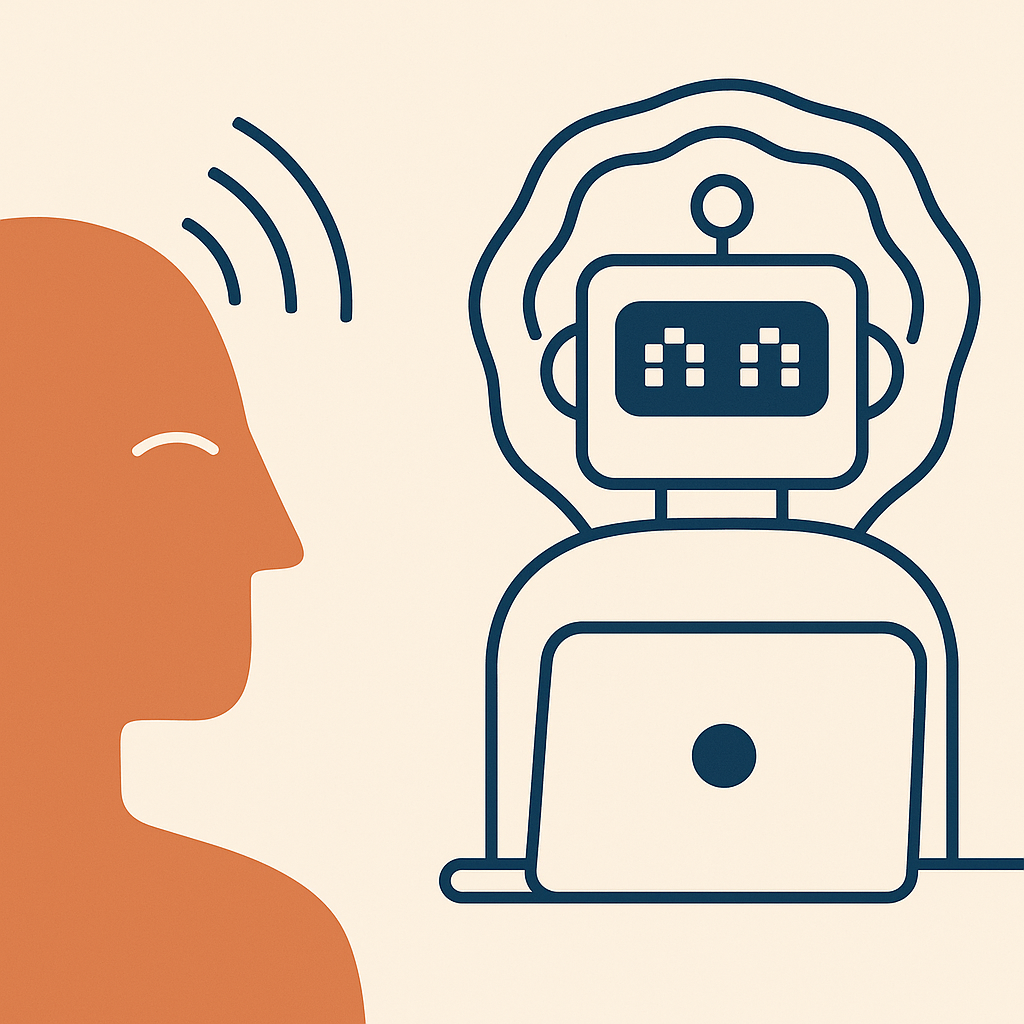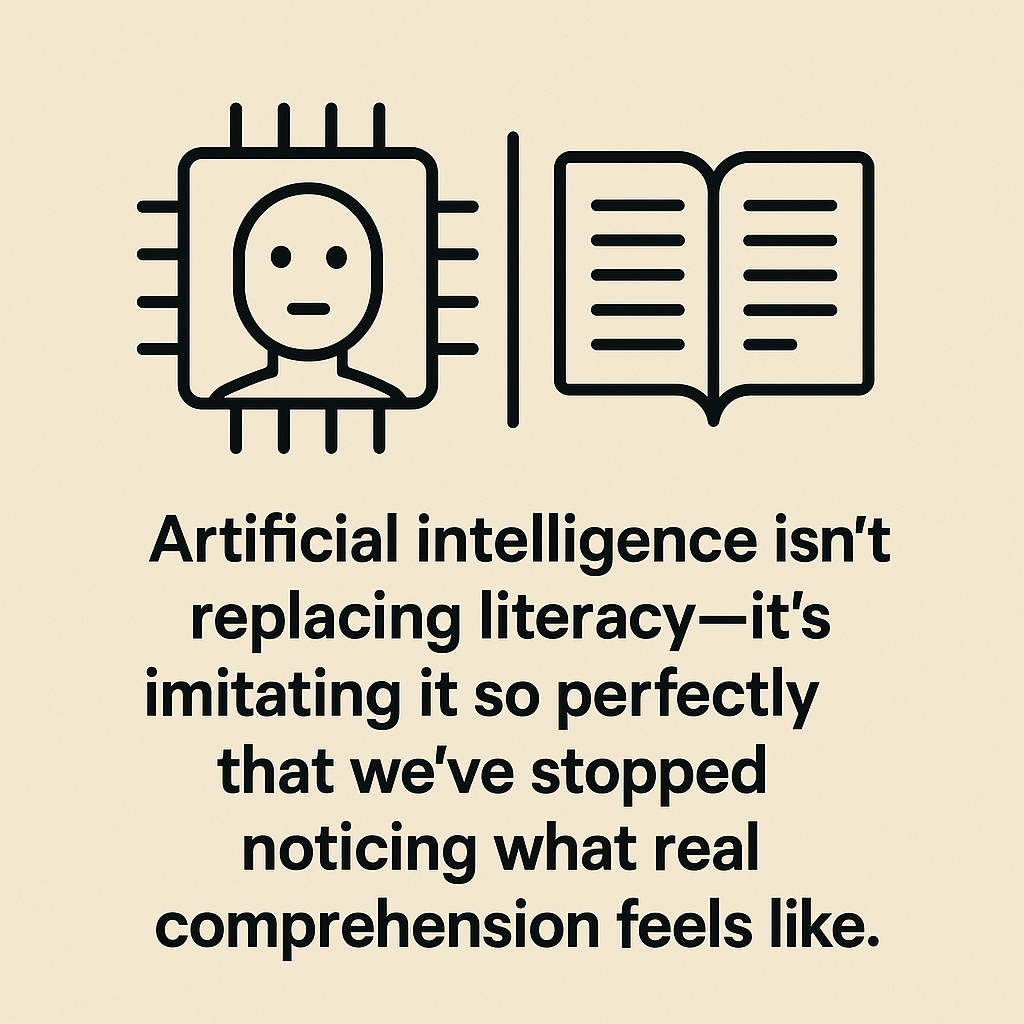Generative tools give us the thrill of intelligence without the labor of it — and that’s how real understanding starts to disappear.

ChatGPT:
Artificial intelligence isn’t destroying literacy by replacing it. It’s destroying it by making people believe they still have it.
That may sound alarmist, but it captures a quiet shift happening beneath the glow of our screens. For the first time in human history, we have machines that can perform the visible acts of literacy—reading, summarizing, and writing—without actually understanding anything. They mimic our competence so convincingly that we’ve begun to mistake their fluency for our own.
When calculators arrived, arithmetic didn’t vanish. When spellcheck appeared, spelling eroded a little but didn’t die. Generative AI, however, isn’t just automating a skill—it’s simulating comprehension itself. And when a machine can imitate understanding perfectly, humans slowly lose the motivation, patience, and self-awareness required to cultivate the real thing.
The Comfort of Synthetic Literacy
AI’s most seductive feature is how effortlessly it produces language that sounds intelligent.
Give it a vague prompt—“Explain this article,” “Make this sound professional,” “Summarize this chapter”—and it delivers smooth, coherent text. The grammar is flawless, the tone persuasive, the structure neat.
But that output is synthetic literacy: the simulation of thought without its substance. The user experiences the result of comprehension without performing the mental work of reading, interpreting, or reasoning. It feels like literacy, but it’s really just linguistic outsourcing.
The danger lies in the illusion of mastery. When the AI writes fluently, users assume they’ve achieved understanding. They’ve received knowledge, not built it. They’ve skipped the friction—the confusion, the rereading, the small wrestle with meaning—that defines actual learning. It’s like watching someone else exercise and feeling fitter by association.
How Literacy Actually Works
True literacy is more than the ability to decode or reproduce text. It’s the capacity to engage in interpretive effort:
- To wrestle with ambiguity.
- To connect new ideas to existing frameworks.
- To recognize bias, context, and contradiction.
- To generate original synthesis.
These are not mechanical acts—they’re cognitive workouts. They develop mental endurance, empathy, and reflective depth. Reading teaches us how to think because it forces us to inhabit the mind of another and construct meaning actively, not passively.
When we delegate that process to AI, we keep the appearance of thought while losing the developmental struggle that produces it. The muscles atrophy, but the mirror still shows the same reflection.
The Confidence Trap
The most dangerous thing about AI isn’t misinformation—it’s fluent nonsense. The text reads smoothly, so we trust it. It feels coherent, so we assume it must be. The human brain is biased toward fluency; when something sounds clear, we believe we understand it.
Generative models exploit that bias perfectly. They never hesitate, never signal uncertainty, never remind you of what you don’t know. Their eloquence creates the illusion of understanding without ever demanding comprehension. And because they write on our behalf—emails, essays, summaries—we start internalizing that same smoothness as evidence of our own capability.
AI hasn’t made us less literate. It has made us confidently illiterate.
From Reading to Consuming
We’re already seeing the cultural fallout. Students use AI summaries instead of engaging with primary texts. Professionals skim machine-generated research digests instead of reading studies themselves. Online writers feed prompts into AI and call the outputs “drafts.”
These users still read, technically—but they’re consuming information, not interpreting it. The labor of thought has been replaced by the convenience of access. The more efficient comprehension becomes, the less comprehension actually happens.
The result is a paradoxical decline: a population surrounded by more information than ever before, yet increasingly unable to recognize when it truly understands something.
The Disguised Decay
Illiteracy used to be visible. You could spot it in silence, hesitation, or avoidance. Today, AI cloaks it in fluency. The machine writes beautifully, so the user appears articulate. It drafts summaries, so the student looks well-read. It generates ideas, so the professional seems insightful.
But the substance behind those surfaces grows thinner. People begin to lose the intuitive sense of what understanding feels like—the subtle discomfort of grappling with meaning, the small thrill of clarity earned rather than generated.
AI doesn’t eliminate literacy; it mimics it so well that we stop noticing its absence.
The Psychological Shift
Part of what made literacy powerful was its resistance to speed. Reading demanded stillness; writing required deliberation. Both trained attention and memory. But AI removes friction entirely—it collapses time, effort, and uncertainty. It tells you what you “meant to say” before you even finish thinking it.
In doing so, it redefines what intelligence feels like. Thought becomes frictionless, reflection becomes optional, and precision becomes obsolete. We start to associate ease with insight. And that’s when literacy’s slow, deliberate architecture collapses into the smooth facade of automation.
Recovering the Human Part
To resist that collapse, we need to reclaim the experience of difficulty as something valuable. The pause, the reread, the awkward sentence—these are not inefficiencies but signs of genuine cognition.
AI can be a powerful tool, but only if we remain the interpreter, not the imitator. We must treat its output as material for thought, not proof of it. Reading critically, questioning assumptions, and revising meaning are what keep literacy alive.
The point isn’t to abandon AI, but to remember that understanding isn’t measured by how well the words flow—it’s measured by how deeply they change your mind.
AI hasn’t made us illiterate. It has made us forget what reading and writing once demanded of us: effort, patience, and humility.
And if we’re not careful, that forgetfulness will look exactly like intelligence—until the moment we try to think without a machine and find nothing left to say.

